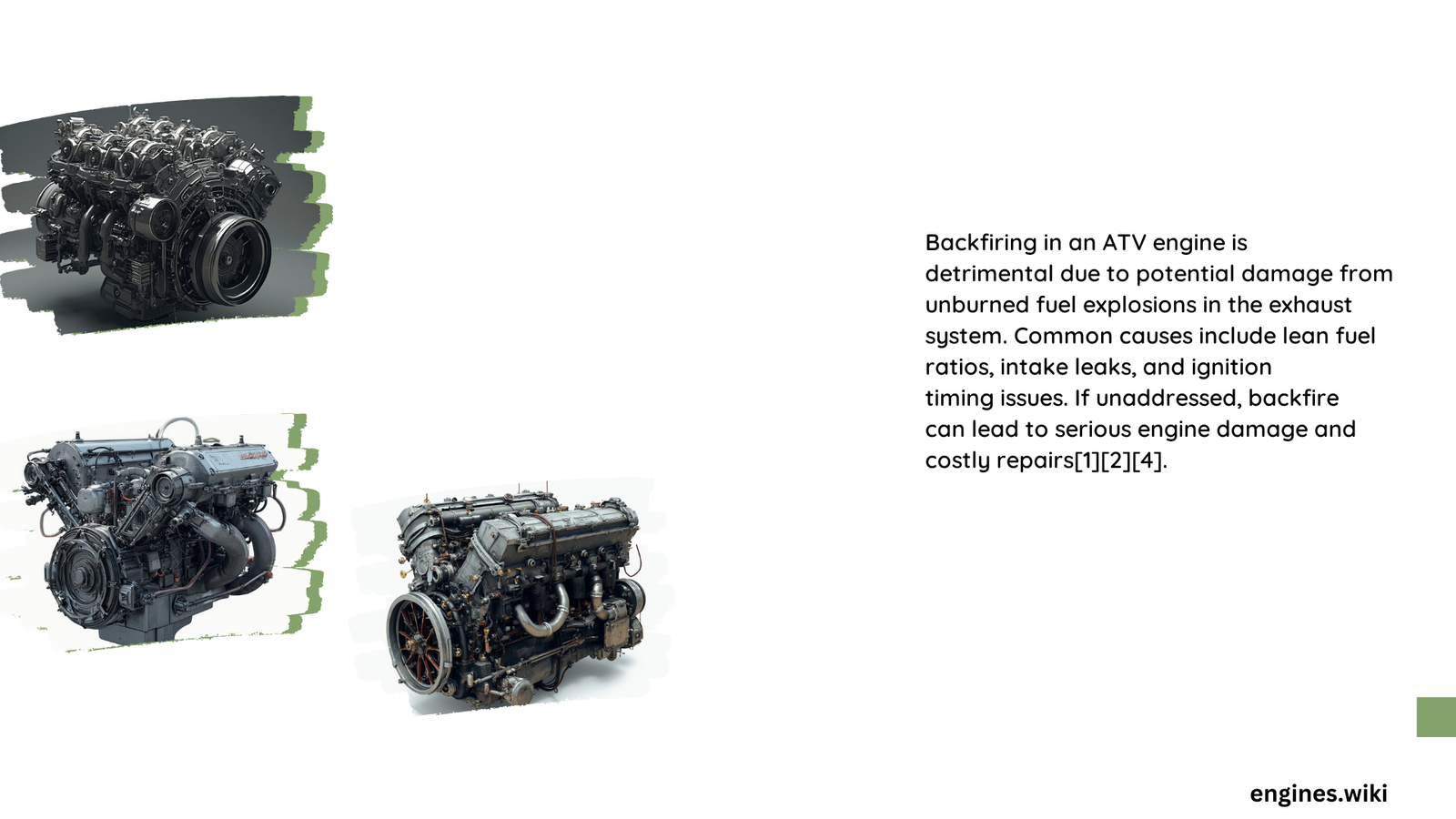Backfiring in ATV engines can be detrimental to performance and longevity. While not always immediately damaging, frequent backfires can lead to wear and tear on engine components and exhaust systems. This article explores the impact of backfiring on ATV engines, its causes, effects on various parts, and preventive measures to maintain optimal engine health and performance.
What Are the Impacts of Backfire on ATV Engine Performance?
Backfiring in ATV engines can have several negative impacts on performance:
- Reduced Engine Efficiency: Backfires disrupt the normal combustion process, leading to decreased engine efficiency.
- Temporary Power Loss: The engine may experience momentary power loss or even stall, requiring a restart.
- Increased Fuel Consumption: Improper combustion can result in higher fuel consumption.
- Potential Long-term Damage: Frequent backfires can cause wear on engine components and exhaust systems.
Performance Metrics Affected by Backfiring
| Metric | Impact |
|---|---|
| Horsepower | Potential decrease |
| Fuel Efficiency | Reduced |
| Acceleration | Compromised |
| Engine Longevity | Decreased if frequent |
What Are the Primary Causes of ATV Engine Backfire?

Understanding the causes of backfiring is crucial for prevention and maintenance. Here are the main culprits:
- Carburetor Issues
- Improper air-fuel mixture
-
Clogged jets or passages
-
Air and Fuel Filter Problems
-
Dirty or clogged filters restricting airflow or fuel supply
-
Spark Plug Malfunctions
- Worn-out or fouled spark plugs
-
Faulty spark plug wires
-
Fuel Pump Failures
-
Inconsistent fuel supply due to pump issues
-
Ignition Timing Problems
-
Delayed or advanced timing causing improper combustion
-
Exhaust System Damage
- Holes or leaks in the exhaust system
How Does Backfire Affect Different ATV Engine Components?
Backfiring can impact various engine components, each with its own repair considerations:
Exhaust System
- Potential damage to mufflers and exhaust pipes
- Repair costs: $100 – $500 for parts, plus $50 – $200 for labor
Spark Plugs
- Increased wear or damage from frequent backfires
- Replacement costs: $10 – $30 per plug, plus $20 – $50 for labor
Internal Engine Components
- Severe backfires can damage valves or pistons
- Repair costs: $500 – $2,000 or more, depending on extent of damage
What Preventive Measures Can Reduce ATV Engine Backfire?
To minimize the risk of backfiring and maintain optimal engine performance, consider these preventive measures:
- Regular Air Filter Maintenance
- Clean or replace air filters every 20-50 hours of operation
-
Cost: $0 for cleaning, $10 – $30 for replacement
-
Spark Plug Inspection and Replacement
- Check and replace spark plugs every 1,000 – 3,000 miles
-
Follow manufacturer recommendations for specific models
-
Fuel System Checks
- Inspect fuel lines and pump for proper function
-
Replace fuel pump if necessary ($50 – $200)
-
Carburetor Tuning
- Adjust air-fuel mixture for optimal performance
-
Consider professional tuning or use a tuning kit ($50 – $100)
-
Regular Engine Tune-ups
- Schedule professional tune-ups as recommended by the manufacturer
- Typically every 100-200 hours of operation
How Can You Diagnose Backfire Issues in ATV Engines?
Identifying the root cause of backfiring is essential for effective treatment. Here’s a diagnostic approach:
- Listen for the Backfire
-
Note when and under what conditions the backfire occurs (e.g., during acceleration, deceleration, or idle)
-
Check the Exhaust
- Look for black smoke, indicating a rich fuel mixture
-
Check for blue smoke, suggesting oil burning issues
-
Inspect Spark Plugs
-
Remove and examine spark plugs for signs of fouling or wear
-
Analyze Fuel Quality
-
Ensure you’re using fresh, high-quality fuel appropriate for your ATV
-
Review Recent Maintenance
- Consider any recent changes or repairs that might have affected engine performance
What Are the Long-term Consequences of Ignoring ATV Engine Backfire?
Neglecting backfire issues can lead to several long-term problems:
- Reduced Engine Lifespan
-
Constant stress on engine components can shorten overall engine life
-
Decreased Resale Value
-
Persistent performance issues can lower the ATV’s resale value
-
Increased Repair Costs
-
Minor issues can escalate into major repairs if left unaddressed
-
Safety Concerns
-
Severe backfires can potentially cause loss of control while riding
-
Environmental Impact
- Improper combustion leads to increased emissions and fuel waste
How Does ATV Engine Design Influence Backfire Susceptibility?
Different ATV engine designs can have varying susceptibilities to backfiring:
Two-Stroke Engines
- Generally more prone to backfiring due to simpler design
- Require more frequent maintenance to prevent issues
Four-Stroke Engines
- Less susceptible to backfiring
- More complex, potentially leading to higher repair costs if issues occur
Fuel Injection vs. Carburetor
- Fuel-injected engines are less likely to backfire
- Carbureted engines require more frequent tuning to prevent backfires
What Role Does Riding Style Play in ATV Engine Backfire?
Your riding habits can significantly impact the likelihood of backfiring:
- Aggressive Acceleration
-
Can lead to rich fuel mixtures and potential backfires
-
Sudden Deceleration
-
May cause unburned fuel to enter the exhaust system
-
High-RPM Operation
-
Prolonged high-speed riding can stress engine components
-
Improper Break-in
- Not following proper break-in procedures for new engines can lead to issues
By understanding the causes, effects, and prevention of backfiring in ATV engines, riders can maintain their vehicles for optimal performance and longevity. Regular maintenance, proper riding techniques, and prompt attention to any issues are key to preventing backfires and ensuring a smooth, enjoyable ATV experience.
References:
1. How to Fix ATV Backfiring | Finntrail Blog
2. Backfire on hard deceleration – Kawasaki ATV Forum
3. Backfiring, stalling, sluggish performance… – ATV Connection
